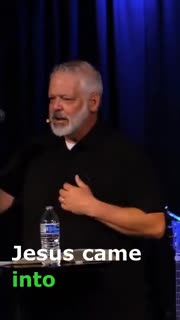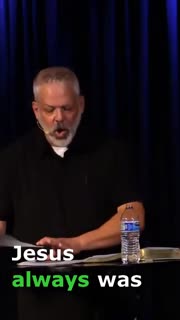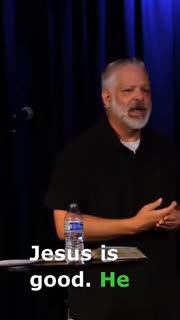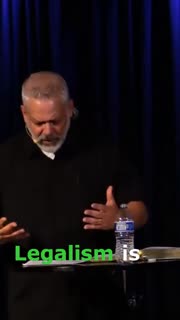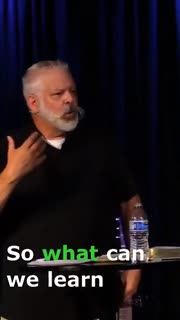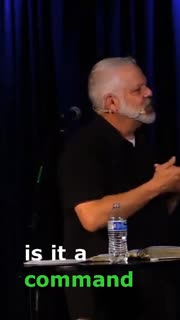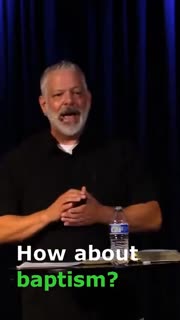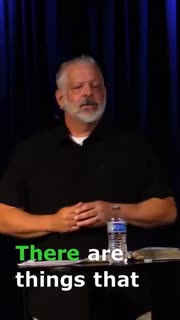Inner Purity: Challenging Traditions in Faith
Devotional
Sermon Summary
Bible Study Guide
Sermon Clips
### Quotes for Outreach
1. "Jesus came into a world that was in chaos. He came into a world where His own people, the Jews, were under the thumb of the Romans, under the thumb of the Roman empire. And the Jewish people were longing for their Messiah. They were longing for their Messiah, but they did not realize Jesus was their Messiah because they were looking for David 2.0, a king, a Messiah who was going to come as a general with military might and make the kingdom of Israel thrive again and drive out the Romans. That's what they expected. That's not how Jesus came, right?" (42 seconds)
2. "Jesus always was asking, what's behind the command? He does that in the Sermon on the Mount and many other places. What's behind the command? The commands of God are good. What's behind it? The Apostle Paul, who wrote two-thirds of the New Testament, who was a Pharisee himself, a law-abiding, good Jewish Pharisee, thought he was doing God a favor by killing these Christians who followed the way of Jesus. Well, just like Jesus, he takes an enemy and turns that enemy into his mouthpiece to go take the gospel to the ends of the known world at the time." (42 seconds)
3. "Jesus is good. He says, the new commands were to love. That we were to love one another. He said, a new command I give you, love one another. As I have loved you, you love one another. So basically Jesus summarizes all of his commands with, what does love require of me in any given situation? What does love require of me? Not the feeling, but the action of love." (25 seconds)
4. "Legalism is when somebody goes beyond the guardrail and adds to it. Legalism is when believers command something of each other that Jesus or scriptures do not. And you can probably think of a gazillion of them. We command things of one another that the scriptures do not. Christian liberty is when we exercise freedom in an area where the Bible is not necessarily black and white. Paul was black and white in 1 Corinthians 7. There's other areas he's like, you have freedom. You know, be led by the Spirit. Love your neighbor. It's always going to boil down to that." (47 seconds)
5. "May the God who gives encouragement and endurance fill your heart and mind today a deep understanding of the good news of Jesus. And may you, may you share that good news, not just verbally, but with your life, with your actions in a life of love. May we, as a church family, walk in unity in the gospel. May we care for one another, love one another, as the Lord told us to." (50 seconds)
### Quotes for Members
1. "So what can we learn from Jesus' interaction with the Pharisees over the traditions? And how can that affect us today? How does it affect us today? Because here we got to be honest with ourselves. There's a little Pharisee in all of us where we can be self-righteous, we can be judgmental, we can have a conviction that maybe is not spelled out. In Scripture, or black and white in Scripture, and we have a conviction one way or the other and we think everybody else should have that same conviction. That's in all of us, that tendency. So how do we go beyond, how do we not go beyond what is written?" (41 seconds)
2. "Is it a command or is it a tradition? And think tradition is going beyond what is written, adding to it. We say that a lot. We don't want to add to the Bible or subtract to it. We want to try to interpret it correctly. So is it a command or a tradition? Psalm 19 verse 8, David says, God's commands are pure. The law of the Lord is good. And it is. A lot of times in Christianity, in the West, we think that the law was just some bad thing to show us our sin. No. The law ordered a society. It was actually a really good thing. But it's not the end. It's a mile marker onto Jesus' fulfillment of the law." (47 seconds)
3. "How about baptism? Should you fully immerse somebody? Should you sprinkle? Or as my Scottish pastor friend, the right way is to pour a big thing of water over the top of somebody's head like the Holy Spirit was poured out. Now here at Novation, we follow the model of Jesus who was fully immersed and that's what we do here. But you know what I'm not going to do? Split hairs and divide with another church or people who believe differently than when we do when it comes to baptism because it's a secondary issue. Baptism comes from the heart. So whatever it is, at the end of the day, it's about your heart and wanting to pledge allegiance to Jesus because of his allegiance to me." (44 seconds)
4. "Communion is the two... Baptism are the two sacred things that Jesus told the church to do, his followers to do. Baptism is a one-time experience. It's kind of like a wedding ceremony. The communion is like a wedding ring. It's a reminder of what Jesus has done for us. He said, do this in remembrance of me. Here's what I want to say, and I hope you'll take this to heart. Let's never let the bread and the juice become a tradition or just become something that we, you know, just kind of take for granted. Go through the motions, if you will. Communion is an experience, a spiritual experience." (49 seconds)
5. "There are things that I used to believe that I don't believe anymore. Not about the fundamentals or the majors, but there are secondary issues. I don't think I see it that way anymore. That's not a bad thing. It's actually caused me to love Scripture even more and to follow Jesus, to trust Him even more. It's healthy. It's maturing to question some of our traditions. It's healthy and maturing to question some of our presuppositions about why we say we believe what we believe. It's actually very, very healthy. Because theology has consequences. What we believe about God and how we interpret the Scriptures has consequences." (48 seconds)
Ask a question about this sermon
1. "Jesus came into a world that was in chaos. He came into a world where His own people, the Jews, were under the thumb of the Romans, under the thumb of the Roman empire. And the Jewish people were longing for their Messiah. They were longing for their Messiah, but they did not realize Jesus was their Messiah because they were looking for David 2.0, a king, a Messiah who was going to come as a general with military might and make the kingdom of Israel thrive again and drive out the Romans. That's what they expected. That's not how Jesus came, right?" (42 seconds)
2. "Jesus always was asking, what's behind the command? He does that in the Sermon on the Mount and many other places. What's behind the command? The commands of God are good. What's behind it? The Apostle Paul, who wrote two-thirds of the New Testament, who was a Pharisee himself, a law-abiding, good Jewish Pharisee, thought he was doing God a favor by killing these Christians who followed the way of Jesus. Well, just like Jesus, he takes an enemy and turns that enemy into his mouthpiece to go take the gospel to the ends of the known world at the time." (42 seconds)
3. "Jesus is good. He says, the new commands were to love. That we were to love one another. He said, a new command I give you, love one another. As I have loved you, you love one another. So basically Jesus summarizes all of his commands with, what does love require of me in any given situation? What does love require of me? Not the feeling, but the action of love." (25 seconds)
4. "Legalism is when somebody goes beyond the guardrail and adds to it. Legalism is when believers command something of each other that Jesus or scriptures do not. And you can probably think of a gazillion of them. We command things of one another that the scriptures do not. Christian liberty is when we exercise freedom in an area where the Bible is not necessarily black and white. Paul was black and white in 1 Corinthians 7. There's other areas he's like, you have freedom. You know, be led by the Spirit. Love your neighbor. It's always going to boil down to that." (47 seconds)
5. "May the God who gives encouragement and endurance fill your heart and mind today a deep understanding of the good news of Jesus. And may you, may you share that good news, not just verbally, but with your life, with your actions in a life of love. May we, as a church family, walk in unity in the gospel. May we care for one another, love one another, as the Lord told us to." (50 seconds)
### Quotes for Members
1. "So what can we learn from Jesus' interaction with the Pharisees over the traditions? And how can that affect us today? How does it affect us today? Because here we got to be honest with ourselves. There's a little Pharisee in all of us where we can be self-righteous, we can be judgmental, we can have a conviction that maybe is not spelled out. In Scripture, or black and white in Scripture, and we have a conviction one way or the other and we think everybody else should have that same conviction. That's in all of us, that tendency. So how do we go beyond, how do we not go beyond what is written?" (41 seconds)
2. "Is it a command or is it a tradition? And think tradition is going beyond what is written, adding to it. We say that a lot. We don't want to add to the Bible or subtract to it. We want to try to interpret it correctly. So is it a command or a tradition? Psalm 19 verse 8, David says, God's commands are pure. The law of the Lord is good. And it is. A lot of times in Christianity, in the West, we think that the law was just some bad thing to show us our sin. No. The law ordered a society. It was actually a really good thing. But it's not the end. It's a mile marker onto Jesus' fulfillment of the law." (47 seconds)
3. "How about baptism? Should you fully immerse somebody? Should you sprinkle? Or as my Scottish pastor friend, the right way is to pour a big thing of water over the top of somebody's head like the Holy Spirit was poured out. Now here at Novation, we follow the model of Jesus who was fully immersed and that's what we do here. But you know what I'm not going to do? Split hairs and divide with another church or people who believe differently than when we do when it comes to baptism because it's a secondary issue. Baptism comes from the heart. So whatever it is, at the end of the day, it's about your heart and wanting to pledge allegiance to Jesus because of his allegiance to me." (44 seconds)
4. "Communion is the two... Baptism are the two sacred things that Jesus told the church to do, his followers to do. Baptism is a one-time experience. It's kind of like a wedding ceremony. The communion is like a wedding ring. It's a reminder of what Jesus has done for us. He said, do this in remembrance of me. Here's what I want to say, and I hope you'll take this to heart. Let's never let the bread and the juice become a tradition or just become something that we, you know, just kind of take for granted. Go through the motions, if you will. Communion is an experience, a spiritual experience." (49 seconds)
5. "There are things that I used to believe that I don't believe anymore. Not about the fundamentals or the majors, but there are secondary issues. I don't think I see it that way anymore. That's not a bad thing. It's actually caused me to love Scripture even more and to follow Jesus, to trust Him even more. It's healthy. It's maturing to question some of our traditions. It's healthy and maturing to question some of our presuppositions about why we say we believe what we believe. It's actually very, very healthy. Because theology has consequences. What we believe about God and how we interpret the Scriptures has consequences." (48 seconds)
